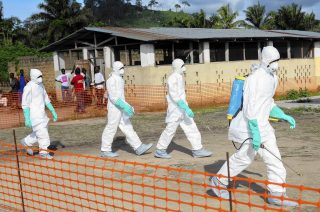Uganda has started an Ebola vaccine trial with an experimental vaccine by Johnson & Johnson in an effort to prevent Ebola from spreading. VOA reports that the vaccine will be administered to health care professionals, ambulance drivers, burial teams and cleaners and is expected to last two years covering 800 people in Mbarara, a district in the southwest of Uganda.
Hopefully, people in this district have been effectively sensitized in readiness for the vaccine trial. Last month the World Health Organization appealled to Ugandans in the western Kasese district who came in contact with Ebola to have faith in the trial vaccine following reports that a dozen of them refused to be vaccinated.
Early last month, Uganda confirmed its first three cases of the current outbreak, all of whom had crossed over from the neighbouring Democratic Republic of Congo where the disease has killed more than 1,800 people. Since last year, the East African country has vaccinated close to 5,000 people including health officials and most recently, people who came in contact with the virus in the Kasese district.
There is yet to be a licensed treatment for Ebola, but a Merck vaccine has been effective so far in containing the spread and mortality of the virus in the DRC with over 170,000 people vaccinated. Unlike the Merck vaccine which requires only a shot and kicks into effect in 10 days, the vaccine by Johnson & Johnson requires two shots, two months apart, hence concerns that it could be difficult to administer, especially as people continue to flee violence in northeastern DRC.
Meanwhile, neighbouring Rwanda has made a significant investment in Ebola preparedness being proactive and engaged at all levels since the outbreak was declared in the DRC a year ago. The country has put in place a detailed National Preparedness Plan and has trained health workers in early detection and response. It has also vaccinated health workers in high-risk areas and continues to sensitize communities about the virus.
With four confirmed cases of the disease, two of whom has died, in DRC’s Goma which shares a border with Rwanda, screening for symptoms at points of entry into Rwanda has been reinforced. The country had to close its border briefly last week due to the human traffic caused by screenings but re-opened it to discourage illicit entries. According to Reuters, an estimated 45,000 people cross the Goma – Rwandan border daily.
As of Sunday, August 4, 2019, the total number of Ebola cases in the DRC was 2763 (2669 confirmed & 94 probable) according to the WHO, including 1849 deaths, 798 survivors, and patients still under care. Although there are currently no confirmed cases of Ebola outside of the DRC, neighbouring countries like Uganda and Rwanda remain at risk due to the influx of refugees fleeing conflicts in North Kivu and Ituri provinces of the DRC.







